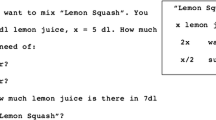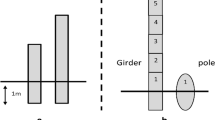Abstract
The objective of the teaching experiment reported in this article was to overcome the “cognitive gap”, that is, students' inability to spontaneously operate with or on the unknown. Following an analysis of the cognitive obstacles involved, this paper reports the results of an alternative approach. We designed an individualized teaching experiment which was tested in six case studies. In the first part the students' natural tendency to group singletons in the unknown within the equations was expanded to a process of grouping like terms. In the second part we introduced a reverse process to grouping like terms, that of decomposition of a term into a sum. This process, combined with the cancellation of identical terms, provides a procedure for the solution of first degree equations with the unknown on both sides of the equality sign. The last part of the teaching experiment involved the decomposition of an additive term into a difference. The first two parts proved very successful and the students developed procedures on their own that were more efficient than the initial ones. The results of the third part, however, revealed the limits of this approach. The students experienced difficulties in choosing the required decomposition. It seems that some of these obstacles are rather robust and perhaps should not be dealt with incidentally but should be addressed as part of a pre-algebra course.
Similar content being viewed by others
References
Bher M. J., Lesh R., Post T. R. and Silver E. A.: 1983, ‘Rational number concepts’, in Lesh R. and Landau M. (eds.), Acquisition of Mathematical Concepts and Processes, Academic Press, New York, pp. 92–128.
Bell, A.: 1988, ‘Algebra-choices in curriculum design’, in Borbas, A. (ed.), Proceedings of the 12th International Conference for the Psychology of Mathematics Education, 1, 147–153.
Bell A., Malone J. A. and Taylor P. C.: 1987, Algebra—an Exploratory Teaching Experiment, Nottingham, England: Shell Center for Mathematics Education.
Booth L. R.: 1988, ‘Children's difficulties in beginning algebra’, in The Ideas of Algebra, K-12, 1988 NCTM Yearbook, National Council of Teachers of Mathematics: Reston, Virginia, pp. 20–32.
Boyer C. B./ Merzbach V. C.: 1991, A History of Mathematics, 2nd edition, revised by Merzbach, John Wiley & Sons, New York, pp. 228–9.
Bruner J.: 1967, The Process of Education, New York: Random House.
Carpenter T. P., Corbin M. K., Kepner H. S., Montgomery Lindquist M. and Reys R. E.: 1981, Results from the Second Mathematics Assessment of the National Assessment of Educational Progress, NCTM: Reston, Virginia.
Cauzinille, E., Mathieu, J. and Resnick, B.: 1984, ‘Children's Understanding of Algebraic and Arithmetic Expressions’, paper presented at the annual meeting of the American Educational Research Association, New Orleans, La.
Chaiklin, S. and Lesgold, S.: 1984, ‘Pre-Algebra Students’ Knowledge of Algebraic Tasks with Arithmetic Expressions’, paper presented at the annual meeting of the American Educational Research Association, New Orleans, La.
Chalouh L. and Herscovics N.: 1988, ‘Teaching algebraic expressions in a meaningful way’, in The Ideas of Algebra, K-12, 1988 NCTM Yearbook, National Council of Teachers of Mathematics: Reston, Virginia, pp. 33–42.
Chalouh, L. and Herscovics, N.: 1984, ‘From letter representing a hidden quantity to letter representing an unknown quantity’, in Moser, J. M. (ed.), Proceedings PME-NA VI, Madison, Wisconsin, pp. 71–76.
Collis K. F.: 1975, The Development of Formal Reasoning, Report of a Social Science Research Council sponsored project (HR2434/1) carried out at the University of Nottingham, University of Newcastle, NSW, Australia.
Collis K.F.: 1974, ‘Cognitive Development & Mathematics Learning’, paper prepared for the Psychology of Mathematics Education Workshop, published at the Shell Mathematics Unit Center for Science Education, Chelsea College, University of London, UK.
Cooney T. J.: 1985, ‘A beginning teacher's view of problem solving’, Journal for Research in Mathematics Education 16, 324–336.
Davis R. B.: 1985, ‘Algebraic thinking in the early grades’, Journal of Mathematical Behavior 2, 310–320.
Davis R. B.: 1975, ‘Cognitive processes involved in solving simple algebraic equations’, Journal of Children's Mathematical Behavior 1, (3), 7–35.
Demana F. and Leitzel J.: 1988, in The Ideas of Algebra, K-12, 1988 NCTM Yearbook, National Council of Teachers of Mathematics: Reston, Virginia, pp. 61–69.
Filloy E. and Rojano T.: 1989, ‘Solving equations: the transition from arithmetic to algebra’, For the Learning of Mathematics 9, (2), 19–25.
Filloy E. and Rojano T.: 1985a, ‘Obstructions to the acquisition of elemental algebraic concepts and teaching strategies’, in Streefland L. (ed.), Proceedings of PME-9, OW & OC, State University of Utrecht: The Netherlands, pp. 154–158.
Filloy, E. and Rojano, T.: 1985b, ‘Operating the unknown and models of teaching’, in Damarin, S. and Shelton, M. (eds.), Proceedings of PME-NA-7, Columbus, Ohio, pp. 75–79.
Filloy, E. and Rojano, T.: 1984, ‘From an arithmetical to an algebraic thought’, in Moser, J. M. (ed.), Proceedings of PME-NA-6, Madison, Wisconsin, pp. 51–56.
Greeno, J.: 1982, ‘A Cognitive Learning Analysis of Algebra’, paper presented at the annual meeting of the American Educational Research Association, Boston, MA.
Harper E.: 1987, ‘Ghosts of Diophantus’, Educational Studies in Mathematics 18, 75–90.
Herscovics N.: 1989, ‘Cognitive obstacles encountered in the learning of algebra’, in Wagner S. and Kieran C. (eds.), Research Issues in the Learning and Teaching of Algebra, Reston, Virginia: NCTM, and Hillsdale, N.J.: Erlbaum, pp. 60–68.
Herscovics N. and Kieran C.: 1980, ‘Constructing meaning for the concept of equation’, The Mathematics Teacher 73, (8), 572–580.
Herscovics N. and Linchevski L.: 1994, ‘The cognitive gap between arithmetic and algebra’, Educational Studies in Mathematics 27, (1), 59–78.
Herscovics, N. and Linchevski, L.: 1992, ‘Cancellation within-the-equation as a solution procedure’, in Geeslin, W. and Graham, K. (eds.), Proceedings of the XVI PME Conference, University of New Hampshire, Durham, 1, pp. 265–272.
Kieran C.: 1992, ‘The learning and teaching of school algebra’, in Grouws D. A. (ed.), Handbook of Research on Mathematics Teaching and Learning, Macmillan Publishing Company, New York, pp. 390–419.
Kuchemann D.: 1981, Children's Understanding of Mathematics: 11–16, London: John Murray, pp. 102–119.
Kuchemann D.: 1978, ‘Children's understanding of numerical variables’, Mathematics in School 7, (4), 23–26.
Linchevski, L. and Sfard, A.: 1991, ‘Rules without reasons as processes without objects-the case of equations and inequalities’, in Furinghetti, F. (ed.), Proceedings of PME XV, Assisi, Italy, pp. 317–325.
Lodholz R.: 1990, ‘The transition from arithmetic to algebra’, in Edwards E. L.Jr. (ed.), Algebra for Everyone, NCTM: Reston, Virginia, pp. 24–33.
Menchinskaya N. A.: 1969, ‘The psychology of mastering concepts: Fundamental problems and methods of research’, in Kilpatrick J. and Wirszup I. (eds.), Soviet Studies in the Psychology of Learning and Teaching Mathematics, V1, SMSG, Stanford, pp. 75–92.
Peck D. M. and Jencks S. M.: 1988, ‘Reality, arithmetic, algebra’, Journal of Mathematical Behavior 7, 85–91.
Sfard A.: 1991, ‘On the dual nature of mathematical conceptions: Reflections on processes and objects as different sides of the same coin’, Educational Studies in Mathematics 22, 1–36.
Sfard A. and Linchevski L.: 1994, ‘The gains and pitfalls of reification: The case of algebra’, Educational Studies in Mathematics 26, 191–228.
Steinberg R. M., Sleeman D. H. and Ktorza D.: 1991, ‘Algebra students’ knowledge of equivalence of equations’, Journal for Research in Mathematics Education 22, (2), 112–121.
Streeter J. and Hutchison D.: 1989, Intermediate Algebra, McGraw-Hill, New York, p. 75.
Usiskin Z.: 1988, ‘Children's difficulties in beginning algebra’, in The Ideas of Algebra, K-12, 1988 NCTM Yearbook, National Council of Teachers of Mathematics: Reston, Virginia, pp. 8–20.
Yerusalmy M.: 1988, Effects of Graphic Feedback on the Ability to Transform Algebraic Expressions when Using Computers, The University of Haifa, Haifa, Israel.
Author information
Authors and Affiliations
Additional information
This research was funded by the Quebec Ministry of Education (Founds FCAR 92-ER-1032).
Rights and permissions
About this article
Cite this article
Linchevski, L., Herscovics, N. Crossing the cognitive gap between arithmetic and algebra: Operating on the unknown in the context of equations. Educ Stud Math 30, 39–65 (1996). https://doi.org/10.1007/BF00163752
Issue Date:
DOI: https://doi.org/10.1007/BF00163752




